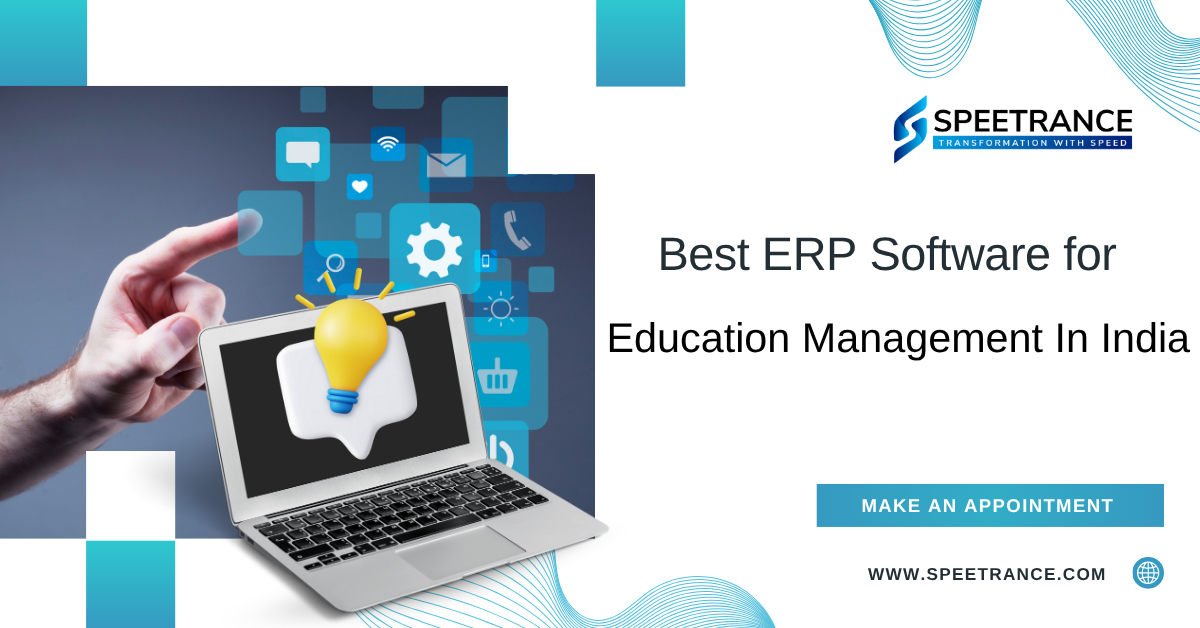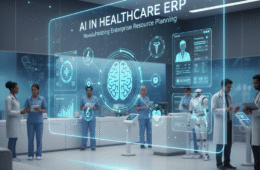
ERP Solutions For Streamlined Education Management
In today’s fast-changing educational environment, colleges across India are taking on digital transformation in order to improve efficiency in administration in academic management, student engagement. A major and powerful instrument driving this transformation can be ERP (Enterprise Resource Planning) software specifically created for managing education. Custom-designed to meet the particular demands of colleges, schools as well as universities. ERP programs streamlines and combines a variety of institutional processes, from admissions exams, attendance, and admissions to the collection of fees as well as staff management and even communication.
With the ever-expanding and complex structure of any Indian education institute, manual systems will insubstantially solve the problems in running the institution. An ERP solution would be a single platform and thus would give correct data, with the minimum administrative burden, so that timely decisions can be implemented with information on hand. Now with the government agencies putting increasing emphasis on digital education and with ever-increasing demands for a smooth learning experience, the ERP system has become a prerequisite for any institution in its bid to remain competitive and ahead of time.
Whether in private schools in the cities or in rural public universities, the education ERP software plays vital roles in advancing Indian education with fosterings of accountability, transparency, and operational efficiency.
ERP Solutions in Education: Transforming Campus Administration
ERP solutions have become powerful tools, and they have given a paradigm shift to the way educational institutions function. In the campus management scenario, ERP systems provide the integrated solution for managing all the improvement aspects in an institute-beginning with student enrollment and faculty administration, then into examination for finance, and all other related activities.
Schools in India have traditionally used siloed systems, manual workflows. This has led to inefficient data, redundant inefficiencies, and gaps in communication. ERP software tackles these issues by giving stakeholders and departments a single platform, synchronizing them within a single database.
Key Ways ERP is Transforming Campus Administration:
-
Streamlined Admissions Process
ERP systems streamline the complete admissions process from application submission to document verification through merit list generation and payment, ensuring transparency and decreasing manual errors.
-
Centralized Student Information Management
Institutions can handle the entire student life cycles, which includes academic records and attendance reports, as well as reports on behavior, as well as health information all in one secure place.
-
Automated Fee and Finance Management
The ERP software facilitates the handling of complex financial processes involving fee collection, scholarships, payroll, and budgeting, thus helping in exact financial tracking and compliance.
-
Efficient Timetable and Examination Scheduling
Timetable creation as well as room assignment, exam scheduling and publication of the results are all automated, thereby saving time and lessening overlaps and conflicts.
-
Enhanced Communication and Collaboration
Tools for real-time communication within ERP systems can increase the engagement of administrators, teachers, students and parents via mobile apps, portals and alerts.
-
Human Resource and Staff Management
From recruiting to performance evaluation along with leave and performance management ERP tools streamline HR processes of educational institutions.
-
Data-Driven Decision Making
With reporting and analytics features, ERP platforms provide a deep understanding of the academic and financial performance of students as well as operational efficiency, which allows more effective management.
Through the transformation of administrative processes into a more efficient, clear, transparent and consistent system, ERP solutions empower educational institutions to concentrate on academic performance and less on paperwork. In the ever-changing and competitive education industry across India, ERP is no longer a luxury, but an essential requirement.
Importance of ERP software In educational institutions
Enterprise Resource Planning (ERP) software plays an important function in enhancing its efficiency, effectiveness and effectiveness of schools. Here’s an overview of its significance:
1. Centralized Data Management
- Unified platform that covers each department (administration, finance, academics, HR and more. ).
- Removes redundant data and provides instant access to up-to-date information.
- Helps make better decisions with central data and reports.
2. Academic Process Automation
- The streamlining of academic core processes, for example:
- Admissions
- Course registrations
- Timetables
- Attendance tracking
- Examination management
- Reduces manual errors and paperwork.
3. Improved Administrative Efficiency
- Automates administrative workflows such as:
- Fee collection and invoicing
- Payroll processing
- Inventory and asset management
- Frees up staff time to focus on strategic tasks.
4. Enhanced Student Lifecycle Management
- Follows the student’s progress from entry to graduation.
- Keeps academic records, performance and attendance records, as well as disciplinary records as well as other records.
- Enhances engagement by utilizing the use of student portals as well as communication tools.
5. Effective Communication and Collaboration
- It allows seamless communications between:
- Teachers as well as students
- Parents and the Administration
- Departments and campuses
- Apps and portals for mobile devices are available for quick access.
6. Data Security and Compliance
- ERP systems guarantee safe storage and secure access to sensitive information.
- Assists in ensuring compliance with the educational regulations and accreditation standards.
- Backups regularly scheduled and data recovery methods are typically combined.
7. Analytics and Reporting
- Creates insightful reports on academic results, financials, and operations.
- Helps institutions recognize patterns, improve their quality, and develop plans for expansion.
8. Customization and Scalability
- The latest ERP systems are flexible and adaptable.
- It is possible to tailor the program to meet the specific needs of small schools or large institutions.
- Expands in line with the institution’s growing demands.
Core Features of an Educational ERP System
Here are the main aspects that make up the Educational ERP System, grouped according to function to help you understand:
1. Student Information Management
- Centralized student database (personal details, academic records, attendance, etc.)
- Tracking enrollment and admission
- Generation of student IDs and verification
- Transfer certificate and management of documents
2. Academic Management
- Planning and preparing the curriculum
- Class timetable scheduling
- Attendance tracking (manual, biometric, RFID-based)
- System of examination and grading
- Project and assignment tracking
3. Fee and Finance Management
- Setup of the fee structure (course-wise or category-wise, installment-based)
- Invoicing and billing can be automated.
- Integration of online fee payments (payment gateways)
- Discounts, scholarships processing, and refunds
- Financial reporting and budgeting
4. Human Resource and Payroll Management
- Profiles and records of employees (teaching as well as non-teaching employees)
- Management of leave and attendance
- Payroll processing and the generation of payslips
- Performance and appraisal tracking
- Onboarding and recruitment
5. Examination and Evaluation Management
- Seating arrangements and scheduling for exams
- Support for exam preparation online and offline
- Grading and marking-sheet generation
- Results publication and analysis
- Integration with transcripts and report cards
6. Library Management System
- Books and resources for cataloging
- Integration of RFID and Barcodes
- Books that are returned or issued
- Fine and late fee management
- Access to digital libraries (optional)
7. Learning Management System (LMS) Integration
- Uploading study materials and other e-content
- Online tests and assignments
- Discussion forums and videos
- Tracking progress of students
8. Communication and Collaboration Tools
- SMS or email and push notifications for mobile phones
- Communication between staff members parents, students, and staff
- Circulars and announcements
- Portal for parent-teacher communication
9. Inventory and Asset Management
- Track physical assets like lab equipment, furniture, books, etc.
- Management of vendor and purchase
- Audits and alerts on stocks
10. Transport and Hostel Management
- Tracking vehicles and routing planning
- Transport allocation for students
- Hostel rooms are allocated and occupied.
- Management of attendance and mess in hostel.
11. Security and Access Control
- Role-based access to admin faculty, students and parents.
- Logs of users and audit trails
- Backups and encryption of data
- Compliance with GDPR/FERPA (if the case is applicable)
12. Analytics and Reporting
- Flexible dashboards, KPIs, and custom-designed dashboards
- Analytics of academic performance
- Operational and financial reports
- In-depth, real-time information to help make strategic decisions
Benefits of ERP Software for Education Institutions
1. Streamlined Administration
- ERP Software for Education automatizes the routine administrative tasks, such as fees, admissions creating timetables and records which reduces manual work and increasing efficiency in operations.
2. Centralized Data Management
- Everything from financial transactions to student records is kept in a single integrated system. This guarantees consistency, reduces duplicates, and provides immediate access to the most accurate data.
3. Improved Academic Management
- Facilitates the scheduling of courses monitoring attendance, course scheduling, and management of exams.
- Faculty can manage their classes, grades and reports with ease.
- Helps to maintain accurate academic records and assessment.
4. Enhanced Communication
- ERP systems provide communication tools (emails, SMS, mobile notifications, portals) to connect students, parents, faculty, and administrators–ensuring timely and transparent updates.
5. Better Decision-Making
- With live-time dashboards and in-depth reports, teachers and administrators can evaluate trends, keep track of the performance of their students, and take decision-based on data to ensure continuous improvement.
6. Increased Productivity
- Automating tedious and time-consuming tasks, ERP allows faculty and staff to concentrate on more important tasks such as coaching, teaching or organizing.
7. Cost and Resource Efficiency
- ERP can help institutions cut costs in the long run through eliminating administrative mistakes, paperwork and inefficient processes. Additionally, it improves the utilization of the resources like staff, classrooms, and inventory.
8. Improved Student and Parent Experience
- Students have access to academic resources including grades, schedules, and grades on the internet. Students can access academic resources, grades, and schedules.
- Parents can keep up-to-date on the performance of their children, attendance and school announcements via portals or through apps.
- Enhances transparency and involvement.
9. Data Security and Compliance
- ERP systems have strong access controls, backups of data and encryption to guarantee data security. They also assist institutions in complying with regulations governing education and auditing requirements.
10. Scalability and Customization
- ERP systems can expand with an institution’s needs, permitting for new users and modules to be added when needed. They can be customized to satisfy specific administrative or academic needs.
11. Eco-Friendly Operations
- Reduced paper use and manual processing helps sustain sustainable initiatives and aids in the creation of a greener campus.
FAQs
Q1. What is ERP software in the context of education?
ERP (Enterprise Resource Planning) software for education is a platform that automatizes all academic, administrative, and financial procedures of schools, such as students’ enrollment, timetable scheduling and fee management exam results as well as HR and other.
Q2. What can ERP help colleges, schools and universities?
An ERP system boosts efficiency through centralizing data and reducing manual labor and improving the collaboration among departments. It also provides real-time information and facilitates communication between staff, students as well as parents.
Q3. Is the ERP Software for education system customizable for different institutions?
Yes. The majority of ERP solutions can be customized and modular to meet the specific requirements of various educational institutions regardless of whether it’s a small institution or a major university.
Q4. Is the ERP software cloud-based or on-premise?
ERP solutions are available in both cloud-based and on-premise solutions. Cloud-based ERP is more sought-after because of its flexibility and lower initial cost and accessibility from any location.
Q5. Is training provided for staff and administrators?
Yes, extensive training is usually included in ERP deployment to assure that the administrators, faculty and staff are properly trained to make use of the system efficiently.
Q6. How secure is the data stored in the ERP system?
Data security is an important aspect. Trustworthy ERP systems utilize security encryption and multi-factor authentication as well as regular backups to secure the sensitive data.
Q7. Can parents and students access the ERP Software for education systems?
Yes. Many ERP Software for education platforms provide parents and students with portals, or mobile apps that give access to grades, attendance announcements, attendance and payment for fees.
Q8. What is the cost of implementing an ERP Software for an education system?
Costs differ based on how big the organization, the number of users and the features that are required. Subscription-based pricing is common especially in ERP Software for education applications that use cloud technology.
Conclusion
ERP software for education is an innovative instrument that helps streamline academic administration, financial, and administrative processes, allowing institutions to focus on delivering high-quality education. Through the use of ERP technology, schools are able to increase productivity, guarantee transparency, and facilitate better communication between all parties. No matter if you’re a manager of a school, college or a university, investing in a reliable ERP solution is an important move towards sustainable success and digital transformation.





